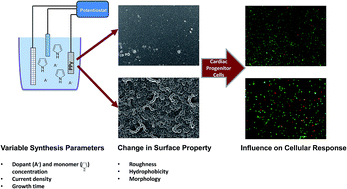Optimisation of conductive polymer biomaterials for cardiac progenitor cells†
Abstract
The characterisation of biomaterials for cardiac tissue engineering applications is vital for the development of effective treatments for the repair of cardiac function. New ‘smart’ materials developed from conductive polymers can provide dynamic benefits in supporting and stimulating stem cells via controlled surface properties, electrical and electromechanical stimulation. In this study we investigate the control of surface properties of conductive polymers through a systematic approach to variable synthesis parameters, and how the resulting surface properties influence the viability of cardiac progenitor cells. A thorough analysis investigating the effect of electropolymerisation parameters, such as current density and growth, and reagent variation on physical properties provides a fundamental understanding of how to optimise conductive polymer biomaterials for cardiac progenitor cells.



 Please wait while we load your content...
Please wait while we load your content...